Discover Life & Faith
Life & Faith

Life & Faith
Author: Centre for Public Christianity
Subscribed: 650Played: 18,966Subscribe
Share
© Copyright 2025 Centre for Public Christianity
Description
Growing up as the son of a diamond smuggler. The leaps of faith required for scientific discovery. An actress who hated Christians, then became one. Join us as we discover the surprising ways Christian faith interrogates and illuminates the world we live in.
566 Episodes
Reverse
With outrage and division at an all-time high, the need for intelligent and respectful persuasion has never been more urgent.Michael McQueen is an author, speaker and social commentator. In an age of intense polarisation and tribalism, he hasn’t given up on the possibility of changing people’s minds. In this interview with Life & Faith, Michael talks about the psychology of stubbornness and how – even on tricky and controversial debates - we can build trust, strengthen relationships and move minds.---ExploreMichael McQueen’s website: https://michaelmcqueen.net/Check out Michael’s latest book Mindstuck: https://www.mindstuck.michaelmcqueen.net/Take a look at this Google Talk by Nobel laureate Daniel Kahneman, on his book as referenced in this episode: Thinking, Fast and Slow: https://www.youtube.com/watch?v=CjVQJdIrDJ0
That’s what disability advocate Emily Korir OAM calls one of the worst things that ever happened to her.In June 2012, Emily Korir suffered a massive stroke. She was just 37 years old, with two young children. It was unclear whether she would survive; and then, whether she would ever walk or speak again. Her road to recovery was long and gruelling – and surprisingly life-giving, both for her and for others.This was far from the first challenge Emily had faced in her life. Born of rape and raised in the slums of Kenya, her journey has been an unlikely one; as the title of her memoir attests, it has been Against All Odds: A Journey of Resilience, Identity & Success.Emily was recently awarded an OAM (Order of Australia) for her service to people with a disability and to multicultural communities. In this conversation, she tells Life & Faith about how she ended up in Australia, why she calls what happened to her a “stroke of luck”, and how she is trying to change the narrative for people living with a disability.“She [my grandmother] made me believe that nothing was impossible. She was a Christian woman and she made me believe that: never, ever to let anybody else’s perception of you become a reality.” --- EXPLORECheck out Emily Korir’s memoir Against All Odds Learn more about the work of BET Group Global
How Orwell’s Nineteen Eighty-Four, Huxley’s Brave New World, and Lewis’ That Hideous Strength predicted our current world disorder. ---Which vision – of a world gone sour – has proved prophetic? Is it George Orwell’s Nineteen Eighty-Four, which introduced terms like “Big Brother”, “doublethink”, “thoughtcrime” to our vocabulary? Or Aldous Huxley’s Brave New World, where people exchange freedom for pleasure ... and everyone is too busy having a good time to worry about being manipulated? Or is it C. S. Lewis’ That Hideous Strength: the third book of Lewis’ “Ransom trilogy” or “Space Trilogy”, published 80 years ago this year? In this episode of Life & Faith, we hear from three expert fans about how each book anticipated our times. Peter Marks, Emeritus Professor in the Discipline of English and Writing at the University of Sydney, walks us through why Orwell’s Nineteen Eighty-Four is “news that has stayed news”, and how Apple, once the upstart defender of individuality, has become a Big Brother-type figure. Peter has written the books Imagining Surveillance: Eutopian and Dystopian Literature and Film and George Orwell the Essayist: Literature, Politics and the Periodical Culture. Scott Stephens, Editor of ABC Religion & Ethics, and co-host with Waleed Aly of the podcast The Minefield, talks about the endless entertainment of Huxley’s Brave New World, and why he thinks Huxley could have invented the recommendation algorithm. And Susannah Black Roberts, an essayist and editor of Plough Magazine in the United States, explores how C. S. Lewis’ That Hideous Strength anticipated the transhuman ambitions of Silicon Valley, and why “staying human” is a way to survive the looming age of AI. ExploreWhy Peter Marks believes Orwell’s Nineteen Eighty-Four is “news that has stayed news”. Matthew Purdy, in The New York Times, arguing: “We are all living in George Orwell’s world now”. Episode of The Minefield podcast where Scott Stephens and Waleed Aly discuss Ray Bradbury’s Fahrenheit 451 and being on the brink of a world without books. Susannah Black Roberts contributed an essay to this collection of writings on the Ransom Trilogy – Life on the Silent Planet: Essays on Christian Living from C. S. Lewis’ Ransom Trilogy George Orwell’s review of Lewis’ That Hideous Strength The Rolling Stone article by Miles Klee arguing “People are losing loved ones to AI-fuelled spiritual fantasies” “They asked an AI
For 80 years Prison Network has helped women find hope, dignity and purpose in and beyond prison.In 1946, a young woman by the name of Myrtle Breen knocked on the door of Pentridge Prison in Melbourne to ask if she could visit the women inside. She was allowed in to spend time with the prisoners, listening to their stories and showing them kindness.She was invited back to do the same and it became her mission in life, becoming the founder of Prison Network, that has been going into prisons ever since.Today, the organisation is working with women in prison, running programs for them and wraparound services, like finding accommodation and employment, assisting them to break cycles of social disadvantage and other factors that land them back in gaol.Today we speak with CEO of prison network Amelia Pickering, and also Pattie Phillips who is someone who received support from Prison Network when she was incarcerated and now participates herself in the work of the organisation striving for dignity, hope, and purpose for women in and beyond prison. Explore:Prison Network website
Peter Hartcher joins Life & Faith to discuss his life in journalism and the precarious state of the world.Peter Hartcher is a leading Australian political and foreign affairs journalist. He has had a long career in the media, beginning with a cadetship at the Sydney Morning Herald fresh out of school in 1982. He is now the Political and International editor for the Herald and for The Age.He had a couple of stints in Tokyo and Washington and at the Australian Financial Review. He is the author of several books, the latest being, Red Zone: China’s Challenge and Australia’s Future.He’s won a number of awards for journalism including a Gold Walkley.Hartcher is known for his incisive commentary, his lively and engaging writing and his careful, sober but hard-hitting style. He hasn’t always been loved by politicians, which is no doubt part of the job description.In this conversation he talks about his career, the future of journalism, the perilous state of the world and why he won’t give in to despair. Explore: Books by Peter HartcherTo The Bitter End: The Dramatic Story of the Fall of John Howard and the Rise of Kevin Rudd (Crows Nest, NSW: Allen & Unwin), 2009.The Sweet Spot: How Australia Made Its Own Luck – And Could Now Throw It All Away (Black Inc.), 2011.Red Zone: China’s Challenge and Australia’s Future (Black Inc.), 2021
Sheridan Voysey, from Friendship Lab, explains why, in an age of increasing loneliness, the art of cultivating friendship is needed as much as ever before.When Sheridan Voysey was confronted with the question, “Who can you call at 2am when everything goes wrong?”, he realised that friendship was a facet of his life he had neglected for too long. This set him on a path to consider how we cultivate good friendships, how we can learn the skills required to be a good friend and maintain deep, rich friendships.He now runs the Friendship Lab, a movement and a course to help adults build the skills to create and sustain healthy friendships. Reflecting on ever-increasing loneliness, Sheridan recognised the need to help people develop skills in collecting more “2am friends”. This is an art you can get better at with the right help. Sheridan says that even those who enjoy great friendships can get better at them.What are the factors that help grow close friendships? What things get in the way of healthy, long-lasting friendships. How can we be better friends to those we are close to?Life & Faith delves into all of this with writer, speaker and broadcaster, Sheridan Voysey, along with a couple of groups of people with enduring and interesting friendships. ---EXPOLREFriendship LabSheridan Voysey's website
Niall Williams discusses the conversion of his treasured novel into a major film starring Pierce Brosnan, Helena Bonham Carter and Gabriel Byrne.Four Letters of Love is the 1997 novel by Irish writer Niall Williams, and has just been adapted, by Williams, into a movie starring Pierce Brosnan, Helena Bonham Carter and Gabriel Byrne.Life & Faith speaks with Niall Williams about the film and the book. It’s a love story that offers up intriguing and provocative portraits of faith, loss, tragedy, meaning and God.The story itself engages with human longing, the notion of fate and calling and whether our lives have any pattern or purpose. How do we make sense of the vicissitudes of life? Is there a God behind it all? Can we still believe in miracles?Niall Williams is an Irish writer of novels, plays and works of non-fiction. Four letters of love was an international best-seller. The film is released July 2025.ExploreFour Letters of Love trailerFour Letters of Love novelNill Williams website
Julia Verdouw used silence, faith and writing poetry to survive the sudden death of her husband.Julia is an accomplished academic and policy expert, but her book In the Valley of the Shadow may be her most important work. Through reflection, poetry and prayers, the book documents her journey of grief.Regardless of who we are or what we believe, suffering comes for us all. Perhaps the worst kind of suffering is the grief that we face when we lose someone we love. How can we navigate such immense loss and deep sorrow?In this episode, we explore Julia’s journey of finding comfort, strength, hope, and even redemption, through the deepest suffering.EXPLOREPurchase Julia’s book through her website
A columnist’s job is to process deeper currents in news, politics, and culture – all in 800 words.Who are we as a nation and a people, and what’s going on for us beneath the daily headlines of the 24/7 media cycle?Few of us stop long enough to wonder – but if we ever wanted to find out, a good place to start would be Sean Kelly’s writing in The Sydney Morning Herald. Sean Kelly is a former political staffer in the Rudd and Gillard governments, who now writes a weekly column on politics for The Sydney Morning Herald. He’s also the author of the book The Game: A Portrait of Scott Morrison.Sean has a front row seat to what’s going on for us as a nation and combines that perspective with an insider’s view of how politics works. In this interview with Life & Faith he considers what it might mean to be considered a chronicler of the national soul. Explore Sean Kelly’s column on how “kindness” won Anthony Albanese the 2025 Federal election.His column about what might be called “the Albanese effect”: the move towards the centre, and the adoption of a less divisive tone, in the new leadership of the Greens and Liberal Party.His book The Game: A Portrait of Scott Morrison
Stories and stats from the UK suggest that something has shifted, spiritually, over the past few years.-- Since 2018, two million more people in England and Wales have started regularly attending church – an increase fuelled largely by Gen Z, and by young men especially.So say the results from a new survey conducted by YouGov on behalf of the British and Foreign Bible Society, results which cut across a bunch of our assumptions: that Western societies are on a secularising trajectory; that women are more religious than men; that young people are more likely to reject “traditional” beliefs such as Christianity.In this episode of Life & Faith, we gather a few reports from abroad to get a handle on what’s happening in the UK, spiritually speaking. Vicar-in-training and Oxford research student Daniel Kim, who has written extensively about spirituality and occult beliefs in contemporary culture, talks about the spiritual openness of Gen Z. Bri Walsh, an Aussie who spent a season in London recently, offers an insider/outsider perspective on UK churchgoing in the 2020s. And Rob Barward-Symmons, co-author of The Quiet Revival – the report that puts concrete numbers to the anecdotal rumblings of the last few years – talks us through the data and what might be driving the recent surge in church attendance.Explore:Check out The Quiet Revival report, by Rob Barward-Symmons and Rhiannon McAleer, from British and Foreign Bible Society https://www.biblesociety.org.uk/research/quiet-revivalRead more from Daniel Kim about contemporary spirituality https://www.seenandunseen.com/contributors/daniel-kim
Got a burning creative project? Face your finitude, says this productivity expert, by learning to number your days. Everyone is pressed for time, and in a never-ending quest to conquer their schedules. It’s why productivity tips and hacks are big business these days.But underneath our productivity problem is a reality no one wants to face: the fact that we’re all going to die, argues self-described “recovering” productivity expert Oliver Burkeman, and the author of Four Thousand Weeks: Time Management for Mortals. The average human life is about 80 years, or some 4000 weeks, and the sooner we come to grips with the ultimate deadline, the better off we’ll be, argues Burkeman.In this interview with Life & Faith, Oliver explains how “mortality” emerged as a theme for his 2021 book, how the solace of “deep time” – as experienced during times of flow, prayer, meditation, and hiking – connects us with our humanity, how AI might change the game for human creativity, and how he, as someone more drawn to Eastern religion, makes sense of our yearning for more time, for more than one life.The shadow of Christianity – with its promise of transcendence, eternity, and being situated in an unfolding story that stretches before and after our earthly lives – looms over the conversation.Explore Oliver Burkeman’s Four Thousand Weeks: Time Management for MortalsOliver Burkeman’s Meditations for Mortals: A Four Week Guide to Doing What CountsOliver Burkeman’s website
Journalist, author and theologian, Stan Grant on responding to injustice with grace and love.In a decades-long career as a journalist and foreign correspondent, Stan Grant saw some of the worst that humanity is capable of. It took its toll on him. And as a Wiradjuri man he has had to wrestle with identity, belonging, and who we all are in 21st century Australia. He went through a period of angst and anger, and he would say, some bitterness, as he and his people confronted injustice, prejudice and a history of oppression, violence and dispossession.But through a serious spiritual re-awakening, Grant has found a different way to be. On Life & Faith he describes the shape of that spiritual life and the surprising ways it has impacted him and how he sees the world and his place in it. Turning his back on anger, Grant outlines his renewed motivation for meeting hate with love and grace.His latest book, Murriyang: song of time, is a poetic account of his life and that of his family and his people, and offers a vision of the healing balm of Christian faith that has inspired Grant to see himself, other people and the creation itself, in a new light. Don't miss this confronting and inspiring conversation! Explore:Stan latest book: Murriyang: Song of TimeLifeline Australia: 13 11 14Beyond Blue: 1300 22 46 36 or beyondblue.org.au
There are currently 7 living generations. That makes for plenty of crossed-wires, misunderstandings and confusion about each other, and the future.In this episode of Life & Faith, we speak to futurist, speaker and author Ashley Fell from McCrindle, a social research and advisory firm that uses cutting edge research and data analysis to decode the generations and make sense of each other and even predict the future.It turns out that there’s much more to each generation than our slang, cultural references or relationship with technology. Join us as we explore how a better understanding of the generations can foster empathy, strengthen social trust and even offer us a window into the future.Explore: McCrindle Research website: https://mccrindle.com.au/ What defines a Generation? (video clip): https://www.youtube.com/watch?v=xMB2_aNINdM Inside the mind of Generation Alpha: https://mccrindle.com.au/article/topic/generation-alpha/inside-the-mind-of-generation-alpha/ Welcome Gen Beta (Article): https://mccrindle.com.au/article/generation-beta-defined/
An Anglican priest on Ash Wednesday, a Benedictine nun on Lent, and a Lutheran minister on Bonhoeffer’s last words.In this episode of Life & Faith, we go beyond the chocolates and hot cross buns to sit with the darkness of the Easter story that unfolds in three acts: dust, desert, and death.Our guests provide different snapshots of the Easter season, and the unexpected glimmers of life to be found in the time.From Anglican priest Chris Allan, from St Andrew’s Cathedral in Sydney, we hear about the visceral experience of having the cross marked on your forehead in ash, and why Ash Wednesday is the ultimate reality check about who we are.Then, Sister Antonia Curtis, from Jamberoo Abbey on NSW’s South Coast, allows us to briefly experience a Desert Day, a time set aside for reflection and contemplation observed by her and her community on Sundays throughout Lent.Lastly, we dwell on the last words of Dietrich Bonhoeffer, the pastor, theologian, and unlikely co-conspirator in the Hitler assassination plot. On the eve of his execution by the Nazis in 1945, Bonhoeffer said, “This is the end. But, for me, the beginning of life”. Rev Dr Mark Worthing, a Lutheran minister and Bonhoeffer scholar, explains how the Easter story decodes those words, and how death is transformed into life.Explore:Sr Antonia Curtis’ online retreat offered through Jamberoo Abbey: “High Horses, Scapegoats, and Donkeys: A Lenten Odyssey”.The Adelaide Bonhoeffer Conference 2025, where Rev Dr Mark Worthing is giving a keynote address in late April.
In the 1940s a group of German students saw it as their duty to oppose the tyranny of Nazism. The members of The White Rose, young students and some lecturers, became convinced that they had to take action against their own government and its crimes. They began a campaign writing and disseminating thousands of pamphlets condemning the Nazis and calling on Germans to embrace passive resistance in order to bring down the regime and end the war.It was a highly risky thing to do. The Nazis were at the peak of their powers and opposition like this simply not tolerated.Brother and sister Hans and Sophie Scholl were part of the group, and, with their friend Christoph Probst, were the first to be arrested, tried and executed. The story of the White Rose continues to challenge and inspire all of us to think about courage in the face of injustice and moral bravery when it costs you a lot.---ExploreAlexandra Lloyd's book, Defying Hitler: The White Rose Pamphlets
In an age of outrage, how can we rise above cynicism and work towards a healthier and more vibrant form of political debate and engagement?With a Federal election campaign looming and cynicism about politics at an all-time high, Life & Faith interviews eminent Political Scientist Professor John Warhurst about how we can navigate an increasingly grumpy political landscape.If politics is downstream from culture and we get the politics that we deserve, how can we do better? Do we expect too much from our politicians or not enough? And do we give up too quickly when things don’t go our way in elections?John Warhurst brings decades of experience to these questions. He believes there are more silver linings than we think and that self-reflection, compassion, gratitude and intelligent humility are an important part of the answer. Instead of focusing on what we think of our politicians, this interview explores how recalibrating how we approach politics as citizens, can put us on a path to a healthier democracy and a more positive public square.
Increasing interest in psychedelics, the occult, and the supernatural all point to one thing: enchantment is back.“The thing is you can't have enchantment that's only selective. You can't only have the bright side. You also need to acknowledge the dark side. That's one of the things I really wanted to do with this book and it caused some consternation with my first publisher. She didn't want the dark side in there.”The modern experience is one of disenchantment, argued sociologist Max Weber – a world from which the supernatural, and all gods and monsters, had been scrubbed.Not anymore, apparently. Increasing interest in the occult, and people’s willingness to share about their ecstatic experiences, as well as their evil encounters with the supernatural, suggests a higher tolerance for talk about the spiritual realm – for good and ill.Life & Faith kicks off 2025 with an eye-opening interview with journalist Rod Dreher, author of Living in Wonder: Finding Mystery and Meaning in a Secular Age. In this wide-ranging chat, Rod talks about the budding religion of technology worship, the experience of art and beauty as a gateway to enchantment, the possibly malign spiritual forces at work in our world, and his increasing conviction that the world is not what you think it is. ---Explore:Rod’s book Living in Wonder Rod’s Substack
The Corbetts arrived in Everton ready to fight losing battles – but they’re winning some too.
—
“Listen to me. You’re grown-ups. This is bad. You are being bad unless you do something about it.”
The words of a seven-year-old kid living in Everton, Liverpool. He had just drawn a picture of an empty plate, with the outline of Africa and Liverpool over the top of it.
“Because I’ve heard kids in Africa are hungry too,” he explained.
In a UK survey called the Index of Multiple Deprivation, Everton is described as the lowest ranking ward in the most disadvantaged local authority in England. Educational attainment is in the bottom 11 per cent of England, income deprivation is in the bottom 9 per cent of England, and then there’s health – it’s better than zero per cent of England.
But these are just numbers.
For Henry and Jane Corbett, and this seven-year-old kid, Everton is home.
“Our little community, on paper, you’ll see stats and you’ll think ‘oh my goodness’,” Jane says. “There’s difficult times, it’s not perfect … but it’s heaven on earth.”
In this episode, the Corbetts share their passion for the Everton community – including all of the highs, and all of the lows.
—
This interview was for CPX's documentary, For the Love of God: How the church is better and worse than you ever imagined. Check it out at betterandworse.film.
You can find out more about the work Henry and Jane Corbett are doing in Everton here: http://www.shrewsburyhouse.org.uk
---
SUBSCRIBE to ‘Life & Faith’ on Apple Podcasts: http://bit.ly/cpxpodcast
FIND US on Facebook: www.facebook.com/publicchristianity
FOLLOW US on Twitter: www.twitter.com/cpx_tweet
---
This episode was first broadcast on 4 May 2017.
The Corbetts arrived in Everton ready to fight losing battles - but they’re winning some too.
---
"Listen to me. You’re grown-ups. This is bad. You are being bad unless you do something about it."
The words of a seven-year-old kid living in Everton, Liverpool. He had just drawn a picture of an empty plate, with the outline of Africa and Liverpool over the top of it.
"Because I’ve heard kids in Africa are hungry too," he explained.
In a UK survey called the Index of Multiple Deprivation, Everton is described as the lowest ranking ward in the most disadvantaged local authority in England. Educational attainment is in the bottom 11 per cent of England, income deprivation is in the bottom 9 per cent of England, and then there’s health - it’s better than zero per cent of England.
But, these are just numbers.
For Henry and Jane Corbett, and this seven-year-old kid, Everton is home.
"Our little community, on paper, you’ll see stats and you’ll think ‘oh my goodness’," Jane says. "There’s difficult times, it’s not perfect … but it’s heaven on earth."
In this episode, the Corbetts share their passion for the Everton community - including all of the highs, and all of the lows.
---
This interview was for our forthcoming documentary, For the Love of God: How the church is better and worse than you ever imagined. Sign up for the Director’s Pass for a look behind the scenes: www.fortheloveofgodproject.com
You can find out more about the work Henry and Jane Corbett are doing in Everton here: http://www.shrewsburyhouse.org.uk
SUBSCRIBE to Life & Faith on Apple Podcasts: http://bit.ly/cpxpodcast
What does the Christmas promise of “peace on earth” mean in the face of human suffering, natural disasters, and other heartbreaks that are part of all our lives?Twenty years ago, the Indian Ocean tsunami claimed the lives of some 225,000 people, after battering the coastlines of India, Indonesia, Malysia, the Maldives, Myanmar, Sri Lanka, Seychelles, Thailand, and Somalia.Tim Costello, then CEO of World Vision, was among the first to be on the ground in Sri Lanka, which was among the countries worst affected. He recounts being confronted with the mammoth scale of devastation on the ground and the tragedy of so many lives lost. Then we hear from former CPX-er Mark Stephens, now Lecturer in New Testament at Sydney Missionary Bible College, about what the Christmas promise of “peace on earth” could possibly mean in the face of untold human suffering – and what are the grounds of hope now and into the future.This is our last episode of Life & Faith for the year but we will be back in 2025. From the whole team at CPX, we wish you a Merry Christmas.


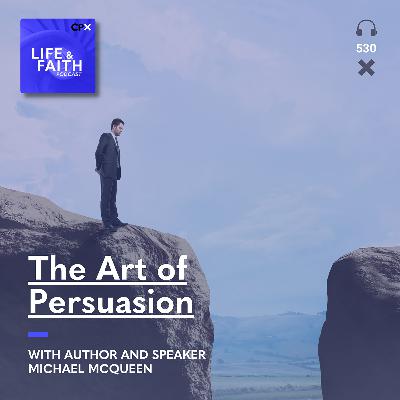
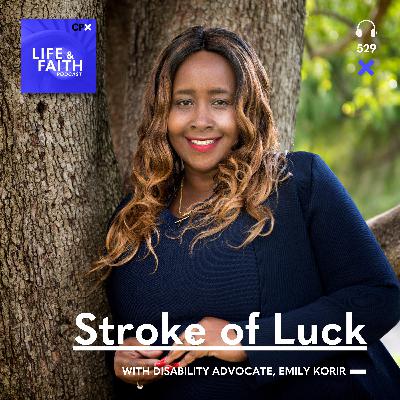

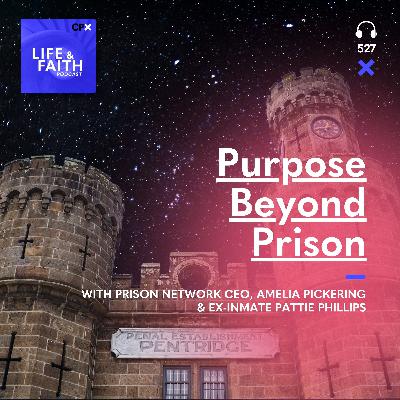
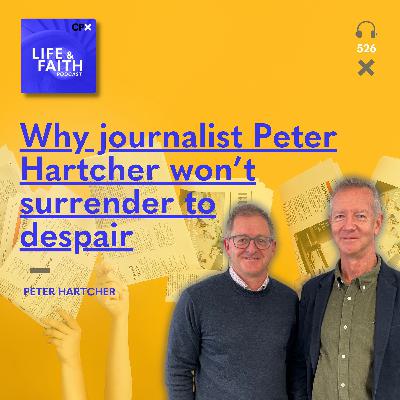
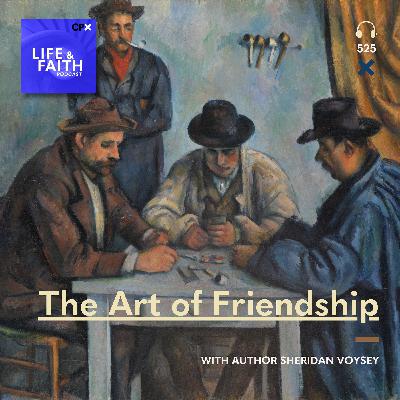



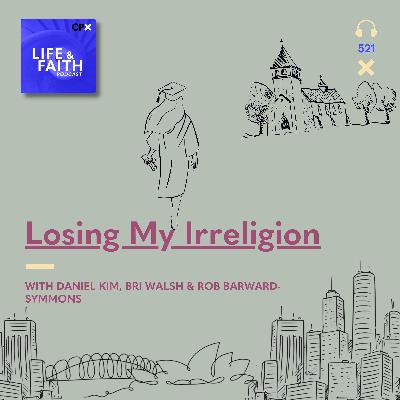
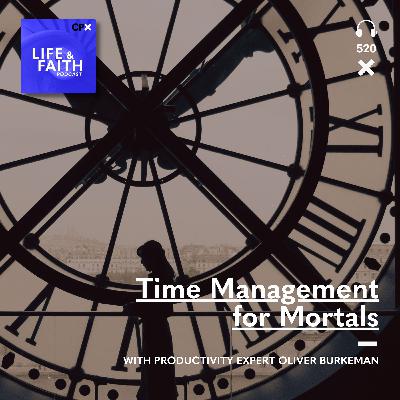

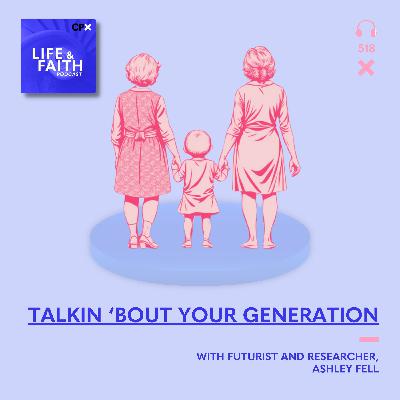
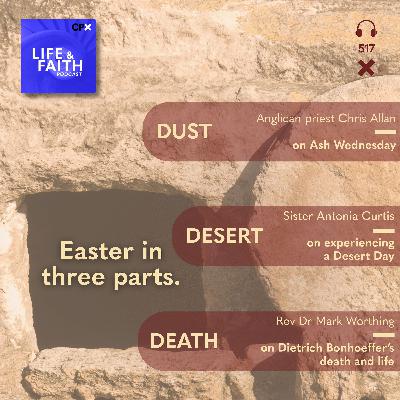

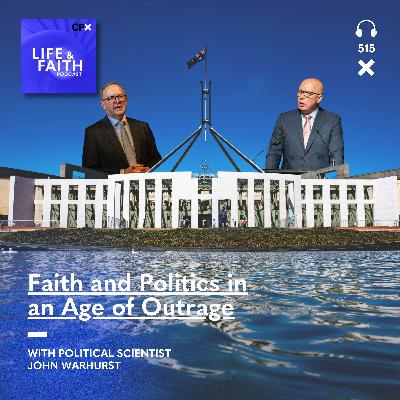



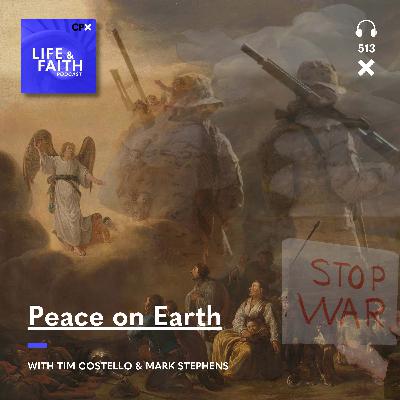



I like your discourse on politics and involvment in faith. What about discussing the faith in the arts